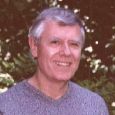A few words about the very personal selection of poems featured on this site: It is simply my own collection of favorite poems – the anthology I would publish – and the motivation for the site is largely that I may keep those favorites conveniently at hand. That the collection is also available to others is a nice side benefit. The works are limited to original English language poems, or in the cases of Milosz, Borges and Tagore, translations into English by – or supervised by – the poet. Great poems obviously exist in many languages, but the difficulty of adequately translating poetry make all translations mere shadows of the original. Because common thought processes and language habits differ among cultures – folks think differently – even ordinary prose cannot be translated accurately. Poetry – which involves the most subtle shadings of a language – belongs to the language and culture in which it was written; it doesn't travel well. I've not included my favorite English long poems, such as Milton's "Paradise Lost" or Chaucer's "Canterbury Tales" (which is represented here by the Prologue). Book-length poems are still best read out of a book.
These are poems that have have resonated with me, some over a lifetime, others just recently. Other lovers of poetry would of course choose different "outstanding poems." The poems I've chosen may have very little in common, but they all – to varying degrees – make creative use of elements that ring my bell: Novelty, Insight, Imagery, Subtlety, Elegance of language, Economy, Surprise, Irreverence, Irony, Power, Cadence, Creative construction, Humor, etc. And I'll confess a fondness for meaningful content. In the end, in spite of millions of hours of effort by professional critics, I think it's not productive to try to analyze the source of the impact of a poem as a whole on the reader, yet that is what matters in the end. These poems have made me smile, whimper, swear, rejoice, and generally stand in awe at what can be done by a master with words.
No poem has meant more to me than Francis Thompson's "The Hound of Heaven." This 19th century Catholic mystic's tale of his frantic search for spiritual satisfaction and of God's simultaneous "unhurrying chase" after his soul has great depth of spirituality and emotion, and rewards repeated readings. Thompson's elegant and expressive language – he freely invents word forms that are meaningful because we recognize cognates – is of the highest order. I count it among the most impressive poems in the English language.
As a body of poetry, the short works created during the brief lifetime of Wilfred Owen are without peer in their evocation of the futility, misery, and wastefulness of the human folly of war. Owen's own fatal participation in the Great War of 1914-1918 (WW I) gives added poignancy to his dark verses.
Another young poet (he lived to be 29) with a superior talent for parodying human foibles with a minimum of words is Stephen Crane. Inspired in part by his senior contemporary satirists Mark Twain and Ambrose Bierce, his ironic irreverence should and will make us think; his poems are by no means over when you've read the last line. These three and others will be found in both the "Poems against War" and "Poems against Folly" indexes.
In my opinion no poet has more successfully and subtly evoked the underlying drama of a seemingly ordinary human encounter than Robert Browning in "My Last Duchess." In this well-known poem, Browning paints a word-picture (partly of a picture, incidentally) that is awesome in its plain, foreboding speech.
I hesitate to go much further with "favorites." There are simply too many. The "greats" are here: Chaucer, Shakespeare, Dickinson, etc. But for readers familiar mainly with the traditional "greats" of the European tradition, I will recommend getting aquainted with two uniquely American traditions: The collections of Black American and American Indian poetry reflect the voices of peoples who have carried their ancient traditions of song, tale, and oral poetry through recent horrific experiences of officially organized or condoned subjection, ethnic cleansing, and genocide. Black published poetry has the older and fuller record of the two, but both share as a theme – expressed or implied – their people's continuing status as victims of offenses that have not been expiated and cannot be set right.
Of modern poets, Howard Nemerov is a personal favorite, while Seamus Heaney and Anthony Hecht are also both high on my list of the all-time greats.
An index of female poets is also offered, running from a sadly half-forgotten 18th century poet of great skill, touch, and inspiration: Anna L. Barbauld, to the best of the current generation.
And how about some limericks to lighten your day? Norman Douglas' selections and commentary will make you smile (or wince).
H.Paul Lillebo
 For anyone interested in which poems are my personal favorites, let me offer a few, but also aver that all the poems on this site are favorites:
For anyone interested in which poems are my personal favorites, let me offer a few, but also aver that all the poems on this site are favorites:

Bon appétit!